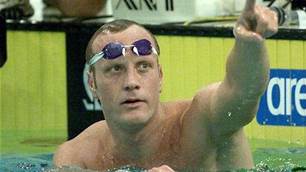We share a couple of cold ones with one of the true legends of Australian rugby.
 Photo by Getty Images
Photo by Getty ImagesWhen the NSW Waratahs get together for their end-of-season awards night and announce their Players' Player of the Year, they give the winner the Matthew Burke Cup. For good reason: he was a fabulous player. Burke burst on to the rep scene in the early 1990s, playing through the Wallabies' golden era of multiple Bledisloes, World Cups and historic wins against the British and Irish Lions. He represented NSW right through to 2004, before heading to England, where he played another four years before hanging up the boots in 2008. He amassed multiple point-scoring records - many of them collected off his excellent boot. He is the second-highest all-time scorer for Australia in Test rugby; he collected 81 Wallaby caps and 878 international points over an 11-year stretch. These days he is back in Sydney, where he is the expert face of Ten's international rugby coverage. And he reads the sports news on that network's Eyewitness evening bulletins, proving himself still a winner with viewers. He took some time out to yarn with Inside Sport editor Graem Sims.
You seem to have picked up sports-presenting like you used to take Stephen Larkham cut-out passes on your chest. Any Broadcast News moments?
Oh yeah. My first day was the eve of the Melbourne Cup, and Fiorente was the favourite – the Gai Waterhouse-trained Fiorente. And when you read the name it doesn’t look anything like Fiorente … And then Sandra (Sully) said, “Sport now with Matt Burke.” And the red light on the camera got me, literally, and the heart rate went up, and I went “Fi … Fi … Fiort … ente.” I finally got it out. But yeah, I’m enjoying it. It’s been a great learning curve.
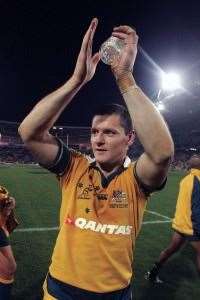 The last game in gold in 2004. Photo by Getty images.
The last game in gold in 2004. Photo by Getty images.You look fit enough to still pull on a gold jersey, but it was the injuries that made up your mind for you to give the game away, wasn’t it?
I wrote an article the other day about Stephen Moore, and how bad you feel for someone when they go down … I can tell you about that: left shoulder reconstruction, right shoulder reconstruction, left knee reconstruction, right knee is rubbish – which is the technical term. Too much kicking over the years. Groin, ankle, back, neck, fingers, wrist – that kind of stuff. You certainly pay the price for what you did, but would you ever give it back? No, not a chance. From what we went through, being able to win over that five years, from ’98 to 2002, that was such a thrill to be a part of. But I can’t throw a ball these days and I struggle when I walk down a hill, and the hips are gone. But the worst thing you can do is stop. If you stop, you’re gone.
If it was injury that ended your professional career for you, it was Ewen McKenzie who effectively ended your Waratah career, wasn’t it?
Yeah. Back in 2004, there was an option in the contract to go again, in their favour, and they chose not to exercise it.
And you weren’t too happy about that?
Aw, you’re never happy about someone telling you you’re too old or too slow, when you feel in yourself that you’ve still got the ability to contribute. I think that’s what the disappointment was. So I went overseas and played another four more years and thoroughly enjoyed it, and think I won three player of the year awards. It was vindication, if that’s the word. The thing about that: I now see Matt Giteau and Drew Mitchell doing their stuff in Europe – over there there’s no pressure on you to earn higher rep duties, as you’re not playing for an Aussie jersey. So if you play poorly you take it on the chin, you talk to your coach and say it won’t happen again; whereas if you play poorly in Super Rugby, that can have a contributing effect – you’re not getting chosen for the Wallabies, and that’s the ultimate goal, to play for your country.
So the European adventure is something you’d recommend?
Oh, it was great. It was under duress obviously to start with … It was difficult. I get to go into an environment where there is a team, whereas my wife literally had no one – that’s the difficult part. But we ended up buying a house overseas – we wanted to live like locals rather than renters. Knowing that you’re going to be there for two years, we decided we’d live for the moment rather than biding our days down, and I think that contributed to why I played so well.
Some guys look super-intense on the paddock, but you’ve always looked like you’re having fun …
Well, that’s the thing: if you really don’t enjoy it, you may as well not play. And the weekend was the culmination of all the hard work. Fans get to see the weekend disappointment or euphoria of a loss or a win, but they don’t realise what it takes you to get to that stage. I battled with a sore knee and I had to manage myself to train enough, but not overtrain. That’s the reason most people do retire. It’s not the games, it’s the amount of training you have to do to get yourself prepared for the game on the weekend.
Do you get on with Ewen McKenzie these days?
Aw mate, that’s water under the bridge these days. It was ten years ago … There were times when you’re bitter and twisted about the whole thing, but I never gave that away when I was here. I was very disappointed, but I kept my cards pretty close to my chest. And that disappointment opened up a whole new world for me and a whole new adventure.
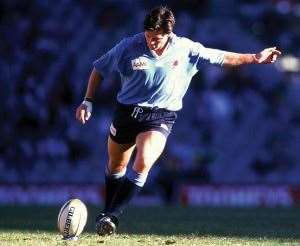 The Waratah stalwart gets off on the right foot in 1996. Photo by Getty Images.
The Waratah stalwart gets off on the right foot in 1996. Photo by Getty Images.Who were the good guys you played with? Which of your team-mates really made playing rugby a real pleasure?
From a Waratahs point of view, Chris Whitaker. He played in an era where he was just behind a pretty special player in George Gregan, which meant he had limited time coming into the national scene. But what he contributed at the Waratahs was outstanding. He’d be my first pick every time; and he took the captaincy after me and everyone jumped on board and he led the team incredibly well. He was a genuine trooper. Nathan Grey: just physical, just hard – you ask him to run straight and he’d ask “how hard” type-thing. In my early days I played with (David) Campese at the Waratahs, albeit fleetingly. But you could see what all the hype was about, and his skills. Though I used to do the majority of his tackles for him – that was the hard part about it …
You’d remind him of that, no doubt?
Oh yeah, my word. And remind him of the tries he scored when I’ve given him the last pass and got smashed while he runs over without a hair out of place. Then at Wallaby level I thoroughly enjoyed playing alongside Tim Horan, Jason Little, Greegs and Larkham . . . When you look back at that backline … Throw Roffy (Joe Roff) and Daniel Herbert in there as well. Great blokes to play with. Timmy especially had fun on the field and I think I learnt from him to enjoy the moment: don’t get over-awed by the situation, but take it all in and have fun while you’re out there because that fun transfers into your playing style.
You played through our last golden era, playing in Wallaby teams that beat the All Blacks in Bledisloes and the British Lions. Do you think our current guys are on the verge of anything special like that? How are we looking against the All Blacks this spring?
Where our guys are at the moment, seven from seven, is a great feat to rack up. But the All Blacks are looking at 18 out of 18; that’s their next goal, which would be a record as well. But what the Wallabies have done is nothing to turn your nose up at: they missed the England game, but won Ireland, Scotland and Wales, Italy, three French – it’s a fair combination. And you’re looking at it through the perspective of that end-of-season tour last year: those blokes are tired, sore and want to go home, but they came home with the goods. More than that, it’s a style and an attitude they’re bringing together now that I think the people are enjoying. Rugby was a bit on the nose for a while with some of the comments and the characters; it seemed some players were just a little bit unappreciative of wearing the gold jersey and that irked a few people. So it seems to me there’s a respect there at the moment and that respect goes a long way. On top of that, you’ve got performances that are worthy of wearing the Wallaby jersey and people jump on board. That last game in Sydney was the full house at the SFS – it was a brilliant game to watch.
What are your first impressions of Michael Hooper in the captaincy role? It’s come to him by default, but he seems completely impressive, don’t you reckon?
Ah, my word. And like any selection, you take it how it comes. If it means through impressive play and pressure on the selectors to choose you, great, or if it comes by injury, you still take it when it’s given to you. He, for mine, has had the perfect rise to that rank. He was under-20s player of the year three years ago, he was rookie of the year two years ago for the Wallabies, he was player of the year last year, and now he’s got the captaincy, albeit by default.
He sounds smart.
Exactly right. His first call as captain in the Brisbane Test was to go for touch rather than kick for goal and that yielded a try with Folau on the left-hand side of the field. You don’t usually shy away from three points, but that showed he had faith in his players to deliver. Yes, there’s a learning curve as well with that with his decision-making, and there were perhaps a couple of errant decisions in Melbourne, but they got away with it and ground out a win. He doesn’t shirk responsibility either by chat or the physical side – he gets stuck in there like the rest of them.
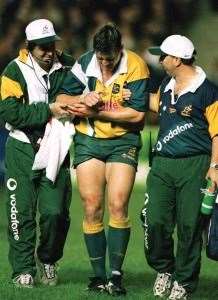 A marked man against the All Blacks in 1998. Photo by Getty Images.
A marked man against the All Blacks in 1998. Photo by Getty Images.Nick Cummins is making quite a name for himself. Now that you’re on the other side of the microphone, do you find yourself wishing that more athletes were more colourful in their comments to the media?
Yeah mate, and you’d know it as well. It’s easy when you finish because you can say whatever you want to say. You can have a joke, you can have a laugh, you can fling a bit of whatever on people. But when you’re in a team environment it’s very contrived. We had media training, and I was guilty of it as well. I listen back to some of those press conferences at work now, whether it’s rugby league or AFL or rugby union, and you think, “Boys! You’ve got to do something better!” It’s just not good enough, you know? I heard one of the boys trot out the other day, literally, the “we gave it 110 percent and it was a game of two halves.” And you go, “Are you kidding?” So I look at it now and I say to the boys that I hope I wasn’t that bad – I hope I wasn’t that mundane. So to have Cummins there, it’s really funny. He’s got that sort’ve ocker Australian manner and everyone’s jumping on board – if anything he’s making it hard for himself to come up with the one-liners week in-week out. But it’s not contrived – it’s him. That’s how he chats.
And can play …
And can play! And backs it up by doing that. He’s got his own philosophy of what he calls a try – he bags a bit of meat. And you just laugh because it’s just great. And that’s what you need rather than the stock-standard. I was guilty of it. I remember in a press conference in Melbourne after we beat the Kiwis and I scored all the points, and at one point I kicked the ball into a big space. One of the journos asked if it was a tactic to kick it long to the fullback. And I said, “Well, if the situation’s on to kick it long and find some space and put pressure on, well then, yes it is, you’re trying your best to put the other guy under pressure.” And all of a sudden Rod Macqueen, who was the coach at the time, kicked me under the table and I said, “Yeah.” And everybody sort’ve looked up and went, “Hang on, you were about to say something else.” But I stopped literally mid-sentence, and Macqueen said to me afterwards, “Mate, don’t give away the tactics!” And I said, “Mate, there were no tactics involved there! If the bloke’s out of position, you kick it there!” But being a young pup you say “yes sir, no sir, three bags full”. But if I had my time again, I’d say, “Mate, he was out of position, I’d kick it like Jack Gibson said – kick to where the seagulls are. Because there’s no one there.” It’s just great to have that individuality that Cummins brings to the game. If the game doesn’t have those characters, it gets to be a bit of a bore, unfortunately.
What about them Waratahs?
Yeah! It’s an attitude change. It’s an understanding that yes, they’re good players, but don’t tell me you’re a good player. Show me that you’re a good player. What Cheika’s done, in effect, is take ego out of the team. He’s said to the guys, “If we’re going to have a go at this, let’s have a real crack. If we’re going to have a common goal, let’s do it well. But let’s play to a certain style, not go to default.” The easiest thing to do is kick the ball, but when you chance your arm and you run it, it actually stresses you more. It puts your skills base under pressure and it makes you make good decisions which in turn have an impact on the team.
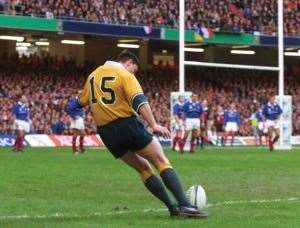 Sealing the World Cup final win in 1999 with his boot against the French. Photo by Getty Images
Sealing the World Cup final win in 1999 with his boot against the French. Photo by Getty ImagesAnd it brings the crowd into the game …
And definitely, that’s important. I must admit I’ve been to a couple of games and watched them and I’m thinking, “Boys, come on! You’ve got to kick it! You’ve got to kick it!” And then all of a sudden, whack, and they’ve made a break. The laws have changed in favour of the player with the ball; there was a period there when you were best off not having it because the penalties you amassed with the ball outweighed the ones when you didn’t have it. Now it’s a case of running it – and they’re all on the same page. I’ve heard Cheika say that if someone kicks it, the rest of the team rip into him! They’ve got a good understanding and they’re playing well – which is just reward, with eight Waratahs in that Wallaby outfit last Test. So that’s great. They’ve finished the season in a good spot – let’s hope they can go with it.
Related Articles
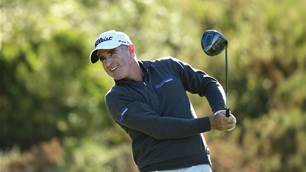
Video interview: Drinks With ... Matt Millar
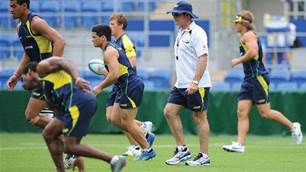
Michael O'Connor still an asset to Aussie 7s squads
